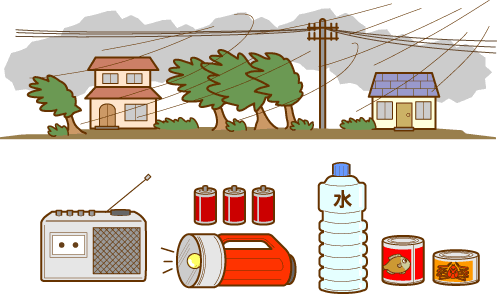Spending the Summer in Yamaguchi
Summer comes to Yamaguchi at the end of the rainly season (usually in mid-July)and continues through mid-September. The average daily temperature is over 25 degrees, with maximum temperatures reaching well over 30 degrees centigrade.
Rainy Season and Mold
- The rainy season comes to Yamaguchi sometimes in June each year, and is characterized by consecutive days of rain and high humidity, thus making mold and mildew a persistent problem.
- In order to prevent mold and mildew during this season, windows should be opened to air out rooms, and futons should be placed outside on sunny days.
Prevention of mold and mildew in drawers and closets can be facililtated by thepurchase of drying agents and dehumidifiers made specifically for this prupose. Thiese agents can be purchased at super markets and drug stores. As leather goods such as bags and shoes are easily damaged by mold and mildow, particular attension should be paid in their care and storage.
Summer and Bugs

 Mosquitoes, ticks, cockroaches, and other harmful insects become more prevalentin the summertime. There are many insecticides (spray, smoke and powder types)on the market.
Mosquitoes, ticks, cockroaches, and other harmful insects become more prevalentin the summertime. There are many insecticides (spray, smoke and powder types)on the market.
Insecticides can be purchased at supermarkets and drug stores.ãThese prouductscan be quite dangerous if used in a manner other than recommended. Store clerksshould be consulted about the usage of these products.
Poisonous Insects
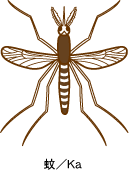 There are a number of insects prevalent during the summer which can cause harm to human.ãPlease be caraful of them, and if bitten or stung, contact a physician immediately.
There are a number of insects prevalent during the summer which can cause harm to human.ãPlease be caraful of them, and if bitten or stung, contact a physician immediately.
Centipade (mukade)
- About five to ten centimeters in length, it has many legs and moves very quickly.
- It is most prevalent in hilly, damp areas.
- Its sting is very painful and causes redness and severe swelling.
- If stung, seek treatment at a hospital.
Pit viper (mamushi)
- About sixty centimeters in length, this snake has brown patterns and a triangular head. Its bite is extremely poisonous.
- It lives in hilly, damp areas.
- While not normally found in the city, particular attention should be paid when hiking in grassy areas.
- When bitten, a sudden sting is followed by extreme pain.
- If bitten, stop blood flow to the area and seek treatment at a hospital immediately.
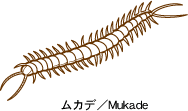 ã
ã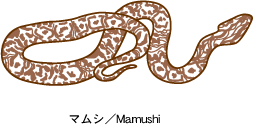
Hornet(suzumebachi)
- About 3-4 cm long, with a red and black pattern.
- If angered, will become very excited and sting a person's face, etc.
- They are very poisonous, and being stung can cause death.
- Its hive is large and round, and is usually located under eaves or in trees, or sometimes in holes in the ground.
- If stung, stop blood flow to the area and seek treatment at a hospital immediately.
- Close contact should be avoided.ãIf a hive is found, contact the EnvironmentProtection Division Environmental Sanitation Section (Tel:934-2776) for information on its disposal.
ããããã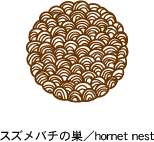
Emergency Treatment for Bites and Stings
Centipede:
- Wash stung area well with soap and water.
- If stung on arm or leg, stop blood flow to heart, remove stinger and suck ourany remainning poison.
- Disinfect area and wrap with clean gauze.
Hornet:
- Remove any remaining stinger with tweezers.
- Squeeze the stung area and suck out any remaining poison.
- Wash the area well with soap and place ice on the wound to bring down any swelling.
- Disinfect the area with antihistamine ointment.
Should nauseousness, severe headaches, wheezing, allergic reaction or shock occur, go the hospital immediately.
Typhoons
- During the summertime and early fall, it is common for typhoons to develop inthe seas south of Japan.
- Typhoons are storms which bring strong winds and rains over the Pacific, and are quite similar to the hurricanes which develop in the Atlantic.
- Should a typhoon whicu has not weakend in force pass over or near Japan, damage to houses and buildings (particularly to the roof), electricity, gas and water failures and floods can result from the strong winds and rains.
- Particular attention should be paid to weather reports on TV and radio duringthe typhoon season.ãShould a typhoon approach, appropriate precautions should be taken by closing storm windows and securing or moving inside anything which might be blow away in strong winds.
- It is advisable to have a battery-operated flashlight and some simple provisions (including drinking water) available in case of a thphoon.
- Should a typhoon pass directly through Yamaguchi, be prepared to go to a temporary shelter usually located at nearby schools or public buildings. For information on the nearest center, call the General Affairs Division of City Hall (Tel:934-2723)
